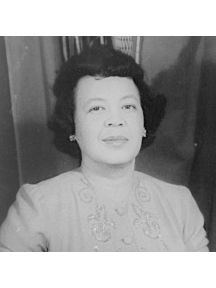Margaret Bonds
-
 Ezek'el Saw the Wheel
Ezek'el Saw the WheelScore and Parts (116-41180): Rental Large Score (416-41307L): $31.99 Study Score (416-41307): $31.99 Full Orchestra with Vocal Soloist -
 He's Got The Whole World In His Hands
He's Got The Whole World In His HandsScore and Parts (116-41181): Rental Full Score (416-41308): $16.99 Large Score (416-41308L): $21.99 Full Orchestra Concerto -
 He's Got The Whole World In His Hands
He's Got The Whole World In His HandsStandard Binding (151-00360): $7.99 Digital (151-00360D): $5.99 Voice, Piano
 Margaret Jeanette Allison Majors was born on March 3, 1913, in Chicago, Illinois. Her father, Monroe Majors, was a physician, lecturer, and author who also was politically active. Her mother, Estella Bonds, was a trained musician who taught piano and served as church choral director and organist. When her parents’ troubled marriage ended in 1917, the young Margaret’s last name was changed to Bonds. She grew up her mother’s home, which was visited by many of the leading black writers, artists, and musicians of the era who either lived in or visited the Chicago area.
Margaret Jeanette Allison Majors was born on March 3, 1913, in Chicago, Illinois. Her father, Monroe Majors, was a physician, lecturer, and author who also was politically active. Her mother, Estella Bonds, was a trained musician who taught piano and served as church choral director and organist. When her parents’ troubled marriage ended in 1917, the young Margaret’s last name was changed to Bonds. She grew up her mother’s home, which was visited by many of the leading black writers, artists, and musicians of the era who either lived in or visited the Chicago area.
Margaret began studying piano with her mother at a very early age. By the time she reached the age of eight, she had progressed to studying at the Coleridge-Taylor Music School. Eventually she studied composition with Florence Price and William Dawson. In 1929, she was admitted to Northwestern University, where she was allowed to study but not to live or make use of facilities. Her years at Northwestern represented her first direct exposure to racism.
Three years into her studies, her piece Sea Ghost won the prestigious Wanamaker award. Bonds received her Master’s Degree in Music from Northwestern in 1934. That same year, she became the first African American to perform with the Chicago Symphony Orchestra, and was the soloist in the premiere of Florence Price’s Piano Concerto in D Minor by the Woman’s Symphony Orchestra of Chicago.
Bonds continued refining her skills as a composer, working with professional composers such as Will Marion Cook and his wife, singer Abbie Mitchell. She also made a living by teaching piano to students, including ten-year-old Ned Rorem. After an unsuccessful attempt to open a music academy in Chicago, Bonds relocated to New York in 1939.
Within a year of her arrival in New York Bonds had become actively involved in the musical theater scene as both a composer and pianist. She also studied composition privately with famed composer Roy Harris and piano with Djane Lavoie-Herz at Juilliard. She toured both as part of a piano duo and, in the late 1940s and early 1950s, as a soloist playing a variety of works. One of her most recorded compositions from this period is “Troubled Water" from the Spiritual Suite for Piano.
During the 1950s, Bonds composed a number of works featuring the poetry of Langston Hughes, whom she met in 1936 and with whom she'd become close friends over the passing years. Bonds' song cycles from this period include Songs of the Seasons and Three Dream Portraits, as well as music for the Hughes play Shakespeare in Harlem. The debut of her Christmas cantata Ballad of the Brown King, which again utilized text by Hughes, was televised by CBS in December 1960. Commissions continued to come Bonds' way, including requests from singers Leontyne Price and Betty Allen. One of Bonds’ most well known settings remains He’s Got the Whole World in His Hands, composed for Price in 1963.
When Langston Hughes died in 1967, Bonds suddenly decided to move to Los Angeles, leaving behind Lawrence Richardson, her husband of 27 years, and their 21-year-old daughter, Djane. She worked with the Los Angeles Inner City Cultural Center and Repertory Theater and offered music instruction to community youths in the basement of the center. Her Credo was premiered by the Los Angeles Philharmonic under the direction of Zubin Mehta in 1972.
Despite her many professional successes, the personal tragedies in her life–especially the deaths of her mother in 1957 and Hughes ten years later–profoundly affected Bonds. She relied on alcohol more and more to cope with bouts of depression. Bonds died following a heart attack on April 26, 1972, and was laid to rest beside her mother’s grave in Chicago. Bonds is remembered today for her activism in promoting the work of Black artists and addressing racial issues through her own music.
